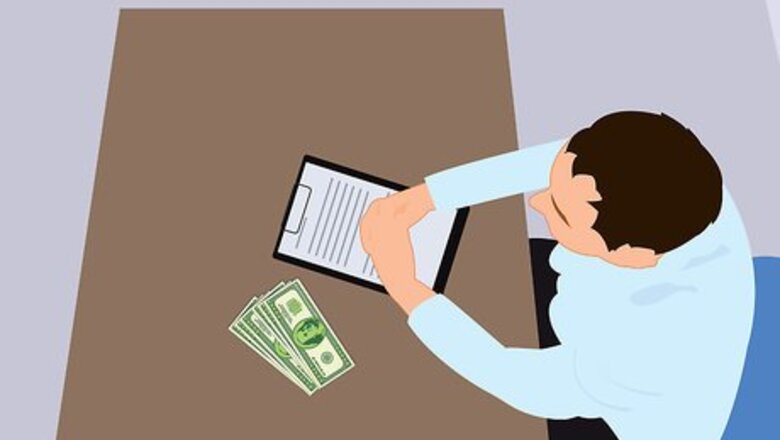
views
Contacting Your Landlord

Check how much you can afford. You don’t want your check to bounce. If your rent is $750 a month but you only have $450 in your checking account, then don’t offer to pay $500 as a partial payment. Your check will bounce and your landlord will get angry. Also, your landlord can charge you a fee if your check bounces. Go through every source of money that you have: checking account, savings account, cash, savings bonds, etc. Add up how much money you have. Also figure out when you will get enough money to pay the rent in full. For example, the parent of your child might be late on child support. If so, you should try to figure out when you will get the full amount. Contact the other parent if you need to. Alternately, your boss might be late with payroll. Ask when you will get your check.

Write your landlord. You shouldn’t wait. As soon as possible, send a note or an email asking if you can make a partial payment, following up with the remainder at a later date. You can begin your letter by saying, “I’m writing to ask if I can make a partial payment on my rent for this month. I unfortunately do not have the full amount at the present moment. Instead, I can pay $300.” Don’t offer the maximum amount that you can afford in the letter. Instead, leave room to go up if the landlord wants to negotiate.
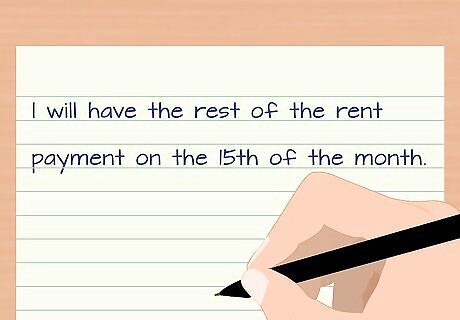
Give a deadline for paying the full amount. You should also tell the landlord the date on which you will have the rest of the rent payment. “I will have the rest of the rent payment on the 15th of the month.”
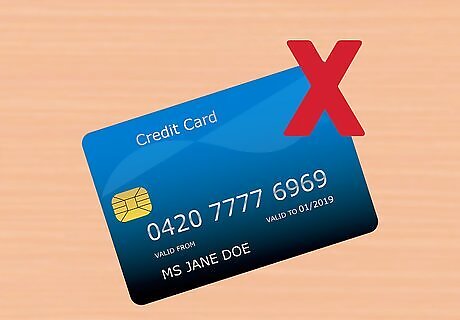
Explain why you are late. If you have a good reason for not having the full amount of rent, you might want to explain the reason to your landlord. However, make sure that you have a legitimate reason for being late. Don’t say you’ve been irresponsible and have to pay your maxed-out credit cards instead. If you give this as your reason for being late with rent, then a landlord will assume you will have difficulty paying rent in future months. However, you might be short of funds for a legitimate reason. For example, you might have started a new job, which is holding your first pay check for a month. In this situation, you will not be late in the future. Explain the situation to your landlord.
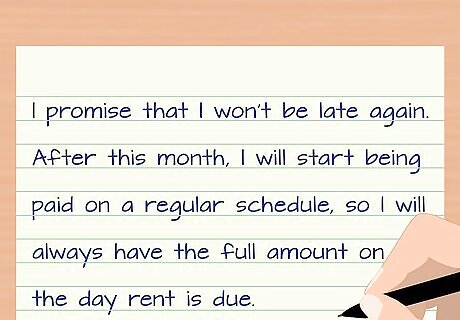
Promise not to be late again. You will have better luck getting the landlord to agree to a partial payment if you promise not to be late again. Also give reasons why the landlord should believe you. You could state, for example, “I promise that I won’t be late again. After this month, I will start being paid on a regular schedule, so I will always have the full amount on the day rent is due.”
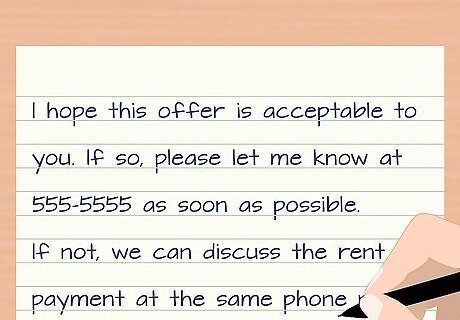
Provide your phone number. You can assume your landlord knows how to contact you. But for ease of reference, close your letter by telling your landlord how to reach you. For example, you could close your letter by saying, “I hope this offer is acceptable to you. If so, please let me know at 555-5555 as soon as possible. If not, we can discuss the rent payment at the same phone number.”
Negotiating a Payment Amount

Hear back from your landlord. Your landlord will either accept partial payment or will reject your offer. If the landlord rejects it, then you will need to negotiate. Your landlord should be willing to accept partial payment if you have been a good tenant and if your reason for being late is plausible. Although your landlord can move to evict you, it will take too much time as a practical matter. Your state law might require that the landlord give you a couple of weeks to get caught up on your rent. Also, if the landlord brings a suit to evict you, you will have a couple weeks to respond. By that time, you probably will have the rest of the money due for rent.

Don’t be afraid to negotiate. Often, people avoid negotiation because of their fears. They fear rejection or looking pushy or angering the landlord. You need to try to overcome your fears in order to negotiate effectively. Ask yourself why you are worried that you might look pushy. Remember that no one will know that you are negotiating other than your landlord. You also shouldn’t fear rejection. At worst, your landlord will reject the partial payment. However, if he does this, then he will need to move to evict you, advertise for a new tenant, and perform background checks on new applicants. That’s a lot of work, especially if the landlord is guaranteed to get the full payment in a few weeks.

Make a counter-offer. If the landlord insists on full payment, then increase the amount you are willing to pay. For example, if you initially offered $300 in your letter, you could offer $400. Say, “I can offer you $400 right now. It’ll be hard to buy groceries, but I can get the money to you today.” Also remind your landlord that you will have the rest of the money soon. “Like I said in my letter, I’m getting paid on the fifteenth, so I can get you the rest of the money then.”

Try to get late fees waived. Your landlord might tack on late charges or interest to any late payment. Often, these charges and fees are spelled out in your lease. Take out the lease and read it. You should ask if you can get the late fees waived. Your landlord might not agree, but it is worth asking. You don’t want to pay more than you have to.
Making Payment

Borrow from family. See if you can get a loan from your parents or other family members. Try to get an interest-free loan. Explain your situation and tell them that you need cash fast to cover your rent payment. Don’t borrow from pay day lenders or other private lenders, which usually charge high interest rates. By taking out these kinds of loans, you are more likely to get further and further into debt.

Sell possessions. If you need to come up with money, you can try to sell possessions. For example, you could pawn valuables such as jewelry or electronic equipment. You might also want to sell items on eBay, though it could take a week or so to complete the sale and get your money. You could also advertise online. You can list items for sale on Craigslist, for example. Name your price and ask for cash payment. By getting cash payment, you won’t have to worry about the buyer’s check bouncing.
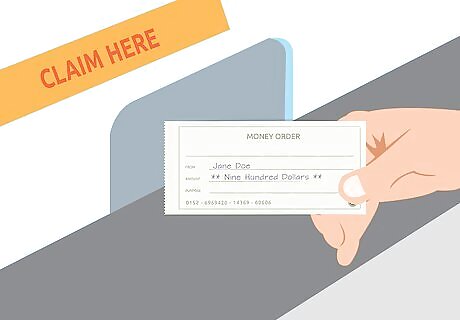
Get a money order, if necessary. You might only have cash on you and not have enough time to get to the bank. In this situation, you can just go to your nearest Post Office and get a money order.


















Comments
0 comment